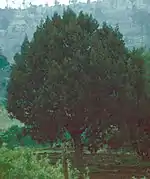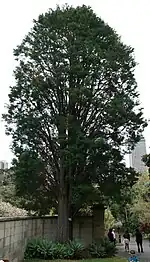mũtarakwa
Kikuyu

mũtarakwa (Juniperus procera)

mũtarakwa (Hesperocyparis lusitanica)
Alternative forms
- mutarakwa[1]
Etymology
Benson (1964) suspects that this term is related to Maasai ol-tarakwai (“Juniperus procera”). Compare also Kalenjin (Markweeta tarakwet and tarokwa, Nandi tarakwet and turkwet, Pökoot tarokwa, Sabaot torokio, Tugen tarokwa).[1]
Pronunciation
- IPA(key): /mòtàɾákoáꜜ/
- As for Tonal Class, Benson (1964) classifies this term into Class 9 with a trisyllabic stem, together with kĩng'aurũ, mbahaca, mwarimũ, and so on.
Noun
mũtarakwa class 3 (plural mĩtarakwa)
- African pencil cedar, East African cedar (Juniperus procera)[2][3]
- Mexican white cedar, Mexican cedar (Hesperocyparis lusitanica, syn. Cupressus lusitanica[4])
- Synonym: mũthithinda
See also
- (Cupressus sp.): mũkarakaba
References
- Maundu, Patrick and Bo Tengnäs (eds.) (2005). Useful Trees and Shrubs for Kenya, p. 270. Nairobi, Kenya: World Agroforestry Centre—Eastern and Central Africa Regional Programme (ICRAF-ECA). →ISBN Accessed online 28 April 2018 via http://www.worldagroforestry.org/usefultrees
- “mũtarakwa” in Benson, T.G. (1964). Kikuyu-English dictionary, p. 432. Oxford: Clarendon Press.
- Leakey, L. S. B. (1977). The Southern Kikuyu before 1903, v. III, p. 1300. London and New York: Academic Press. →ISBN
- Maundu & Tengnäs, op. cit., p. 184.
This article is issued from Wiktionary. The text is licensed under Creative Commons - Attribution - Sharealike. Additional terms may apply for the media files.